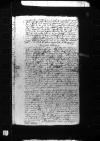Aus Ewer Erbarkeit cf. Elbing Town Council to Ioannes DANTISCUS Elbing (Elbląg), 1539-07-19, CIDTC IDL 2195⌊cf. Elbing Town Council to Ioannes DANTISCUS Elbing (Elbląg), 1539-07-19, CIDTC IDL 2195⌋, / den XIX dits monts gebenn, / hab wir nicht sonder erschrecken vorstandenn, wie Ambrosius Feyerobent (Ambrosius Feierabend) (*ca. 1490 – †after 1543), Lutheran preacher; in his sermons he denied the real presence of Christ in the Eucharist. In 1539 Dantiscus demanded his arrest; until 1539 parish priest of the Three Kings' Church in the New Town of Elbing (Nowe Miasto Elbląg) (WAŁDOCH, p. 33)⌊Ambrosius FeyrobentAmbrosius Feyerobent (Ambrosius Feierabend) (*ca. 1490 – †after 1543), Lutheran preacher; in his sermons he denied the real presence of Christ in the Eucharist. In 1539 Dantiscus demanded his arrest; until 1539 parish priest of the Three Kings' Church in the New Town of Elbing (Nowe Miasto Elbląg) (WAŁDOCH, p. 33)⌋ mit dem allerheiligsten leichnam unsers hern Jesus of Nazareth (Jesus Christ), in Christianity the Messiah foretold in the Old Testament⌊Ihesu ChristiJesus of Nazareth (Jesus Christ), in Christianity the Messiah foretold in the Old Testament⌋ umbgangen und wie blasphemisch und lesterlich dar von gepredigt, / worin Ewer Erbarkeit cristlich / und wol hettenn gethon, / solchen teuflischenn menschen zuvorhalten / bis zu unsermm weiternn bericht. / Von welchenn Goth voracht wirt, / in den ist kein treu und gloubnn, / derwegen er nicht domit , sonder mit kettenn sold sein vorhafft wordenn. / Dieweil es das so gefarenn, / vorbittenn und behemmen wir bey Ewer Erbarkeit krafft ... briffs in der alt und newenn Elbing (Elbląg), city in northern Poland, Pomerania, on the Vistula Lagoon, one of the three Great Prussian Cities (beside Gdańsk (Danzig) and Thorn (Toruń)) which had representatives in the Prussian Council; member of the Hanseatic League⌊statElbing (Elbląg), city in northern Poland, Pomerania, on the Vistula Lagoon, one of the three Great Prussian Cities (beside Gdańsk (Danzig) and Thorn (Toruń)) which had representatives in the Prussian Council; member of the Hanseatic League⌋ des gedochten lesterers alle schulde und gutter, wor die sein mugenn, / die selbten an unsernn zuloss nymants zu uberlossenn / und wold Got, das in, / dissen vorgessenenn an Goth menschen, Ewer Erbarkeit mochten zu wege brengen. / Wolt wir weiter anczeigen, / was zu thun etc. Ouch cf. [Ioannes DANTISCUS] to [Georg von POLENTZ] Heilsberg (Lidzbark Warmiński), 1539-07-23, CIDTC IDL 4108⌊cf. [Ioannes DANTISCUS] to [Georg von POLENTZ] Heilsberg (Lidzbark Warmiński), 1539-07-23, CIDTC IDL 4108⌋ wir derwegen dem Georg von Polentz (*1478 – †1550), the first Protestant bishop of Samland; private secretary of pope Julius II; 1516 Komtur in Königsberg; 1518 bishop of Samland (also after the secularization of bishopric in 1525); 1521-1523 administrator of Pomesania bishopric (ADB, Bd. 26, p. 382-385; ORACKI 1988, p. 85-86)⌊hern von SamlantGeorg von Polentz (*1478 – †1550), the first Protestant bishop of Samland; private secretary of pope Julius II; 1516 Komtur in Königsberg; 1518 bishop of Samland (also after the secularization of bishopric in 1525); 1521-1523 administrator of Pomesania bishopric (ADB, Bd. 26, p. 382-385; ORACKI 1988, p. 85-86)⌋, / wolt an in dissen beygebunden briff lossenn gelangen etc. Dem bruder Augustino schicke wir hiemit uff VI monat ein commenda, / biss das wir uns weiter mit Ewer Erbarkeit mugen bereden, / die wir Gote in sein gnad befelenn. /
